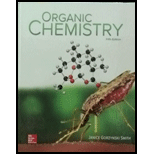
Organic Chemistry
5th Edition
ISBN: 9780078021558
Author: Janice Gorzynski Smith Dr.
Publisher: McGraw-Hill Education
expand_more
expand_more
format_list_bulleted
Question
Chapter 8, Problem 8.64P
Interpretation Introduction
Interpretation: The stereoisomer of
Concept introduction: The one-step bimolecular elimination reaction that favors the removal of a proton by a base from carbon adjacent to the leaving group that results in the formation of a carbocation is termed as
Expert Solution & Answer
Want to see the full answer?
Check out a sample textbook solution
Students have asked these similar questions
Explain why 1-bromo-2,2-dimethylpropane has difficulty undergoing both SN2 and SN1 reactions. . Can it undergo E2 and E1 reactions?
Which of the following hexachlorocyclohexanes is the least reactive in an E2 reaction?
3-bromo-1-pentene and 1-bromo-2-pentene undergo SN1 reaction at almost the same rate, but one is a secondary halide while the other is a primary halide. Explain your answer. Then,
decide which the following compounds will react faster in an E2 reaction; trans-1-bromo-2-isopropylcyclohexane or cis-1-bromo-2-isopropylcyclohexane.
and Explain your answer.
Chapter 8 Solutions
Organic Chemistry
Ch. 8 - Problem 8.1 Label the and carbons in each alkyl...Ch. 8 - Problem 8.2 Classify each alkene in the following...Ch. 8 - Prob. 8.3PCh. 8 - Prob. 8.4PCh. 8 - Problem 8.5 Label each pair of alkenes as...Ch. 8 - Problem 8.6 Which alkene in each pair is more...Ch. 8 - Problem 8.7 Several factors can affect alkene...Ch. 8 - Prob. 8.8PCh. 8 - Prob. 8.9PCh. 8 - Prob. 8.10P
Ch. 8 - Prob. 8.11PCh. 8 - Problem 8.12 What alkenes are formed from each...Ch. 8 - Prob. 8.13PCh. 8 - Problem 8.14 What alkenes are formed from each...Ch. 8 - Problem 8.15 How does each of the following...Ch. 8 - Problem 8.16 Draw both the SN1 and E1 products of...Ch. 8 - Prob. 8.17PCh. 8 - Prob. 8.18PCh. 8 - Problem 8.19 Explain why...Ch. 8 - Prob. 8.20PCh. 8 - Problem 8.21 Draw the alkynes formed when each...Ch. 8 - Problem 8.22 Draw the products in each...Ch. 8 - Problem 8.23 Draw a stepwise mechanism for the...Ch. 8 - 8.24 Rank the alkenes shown in the ball-and-stick...Ch. 8 - Prob. 8.25PCh. 8 - 8.26 What is the major E2 elimination product...Ch. 8 - Prob. 8.27PCh. 8 - Prob. 8.28PCh. 8 - Prob. 8.29PCh. 8 - 8.30 Label each pair of alkenes as constitutional...Ch. 8 - Prob. 8.31PCh. 8 - Prob. 8.32PCh. 8 - Prob. 8.33PCh. 8 - For each of the following alkenes, draw the...Ch. 8 - Prob. 8.35PCh. 8 - Prob. 8.36PCh. 8 - Prob. 8.37PCh. 8 - What alkene is the major product formed from each...Ch. 8 - Prob. 8.39PCh. 8 - Prob. 8.40PCh. 8 - Pick the reactant or solvent in each part that...Ch. 8 - 8.42 In the dehydrohalogenation of...Ch. 8 - Prob. 8.43PCh. 8 - Prob. 8.44PCh. 8 - Prob. 8.45PCh. 8 - Prob. 8.46PCh. 8 - Prob. 8.47PCh. 8 - Prob. 8.48PCh. 8 - What alkyl chloride affords the following alkene...Ch. 8 - Draw the products formed when each dihalide is...Ch. 8 - Draw the structure of a dihalide that could be...Ch. 8 - Under certain reaction conditions, 2,...Ch. 8 - For which reaction mechanisms, SN1, SN2, E1 or...Ch. 8 - Draw the organic products formed in each...Ch. 8 - Prob. 8.55PCh. 8 - Draw all products, including stereoisomers, in...Ch. 8 - Draw all of the substitution and elimination...Ch. 8 - Prob. 8.58PCh. 8 - 8.59 Draw a stepwise, detailed mechanism for each...Ch. 8 - Draw the major product formed when...Ch. 8 - Draw a stepwise, detailed mechanism for the...Ch. 8 - Explain why the reaction of with gives ...Ch. 8 - Draw a stepwise detailed mechanism that...Ch. 8 - Prob. 8.64PCh. 8 - 8.65 Explain the selectivity observed in the...Ch. 8 - Prob. 8.66PCh. 8 - Prob. 8.67PCh. 8 - 8.68 (a) Draw all products formed by treatment of...
Knowledge Booster
Similar questions
- Given that an E2 reaction proceeds with anti periplanar stereochemistry, draw the products of each elimination. The alkyl halides in (a) and (b) are diastereomers of each other. How are the products of these two reactions related? Recall from Section 3.2A that C6H5 −is a phenyl group, a benzene ring bonded to another group.arrow_forwardGiven that an E2 reaction proceeds with anti periplanar stereochemistry, draw the products of each elimination. The alkyl halides in (a) and (b) are diastereomers of each other. How are the products of these two reactions related? Recall from Section 3.2A that C6H5– is a phenyl group, a benzene ring bonded to another group.arrow_forwardFor each of the following compounds, indicate all the products (ignoring stereochemistry) that could be formed when they undergo E2 reactions. If more than one E2 product is possible, indicate which one, if any, is the major product.arrow_forward
- Which isomer reacts more rapidly in an E2 reaction: cis-1-bromo-4-tert-butylcyclohexane or trans-1- bromo-4-tert-butylcyclohexane? Explain your answer.arrow_forwardThe reaction of cyclopentanol with HBr will most likely proceed via: a. E2 b. E1 c. SN1 d. E1cb e. SN2arrow_forwardDefine the Stereochemistry of the E2 Reaction ?arrow_forward
- Explain why 1-bromo-2,2-dimethylpropane has difficulty undergoing both SN2 and SN1 reactions.arrow_forwardConsider the E1 reaction of 3-bromo-2-cyclohexyl-butane. How many elimination products are possible? Include (E)/(Z) isomers as separate products.arrow_forwardConsider 3-iodo-2,3-dimethylpentane and 3-iodo-2methylpentane. a. which reacts faster in an Sn2 reaction? Explain. b. which reacts faster in an E2 reaction? Explain.arrow_forward
- The isomer of 1,2,3,4,5,6-hexachlorocyclohexane shown undergoes E2 elimination 7000 times more slowly than any of its steroisomers. Explain this observation.arrow_forwardWrite the major product of each reaction and what kind of mechanism it is: sn1, sn2, e1, e2.arrow_forwardIncreasing the number of R groups on the carbon with the leaving group forms more highly substituted, more stable alkenes in E2 reactions. Explain this ?arrow_forward
arrow_back_ios
SEE MORE QUESTIONS
arrow_forward_ios
Recommended textbooks for you
 Organic ChemistryChemistryISBN:9781305580350Author:William H. Brown, Brent L. Iverson, Eric Anslyn, Christopher S. FootePublisher:Cengage Learning
Organic ChemistryChemistryISBN:9781305580350Author:William H. Brown, Brent L. Iverson, Eric Anslyn, Christopher S. FootePublisher:Cengage Learning

Organic Chemistry
Chemistry
ISBN:9781305580350
Author:William H. Brown, Brent L. Iverson, Eric Anslyn, Christopher S. Foote
Publisher:Cengage Learning
